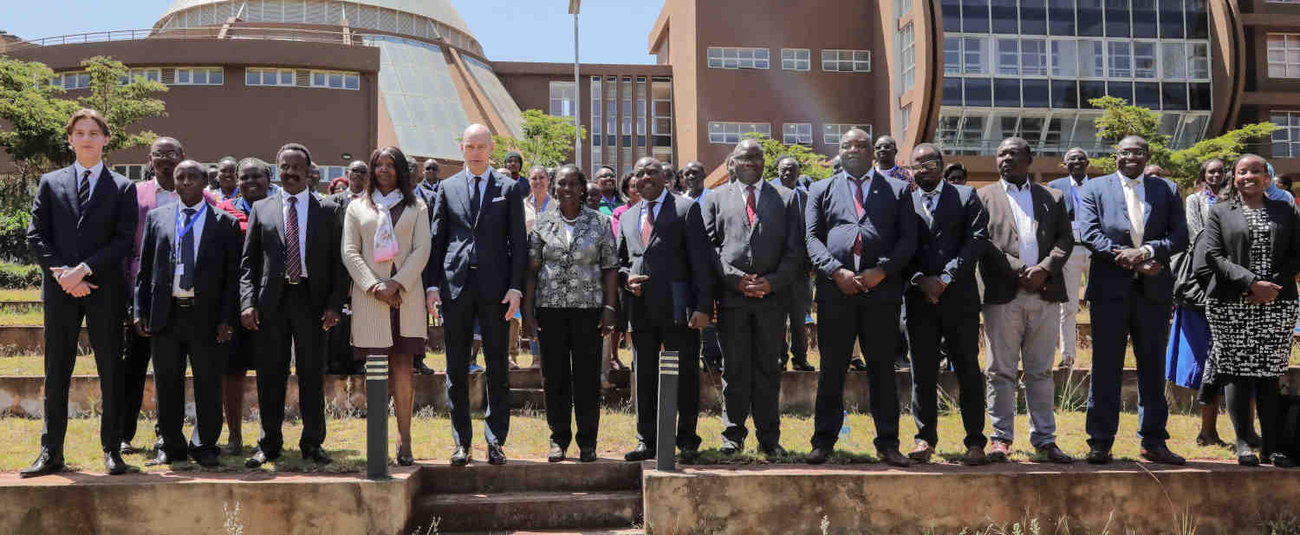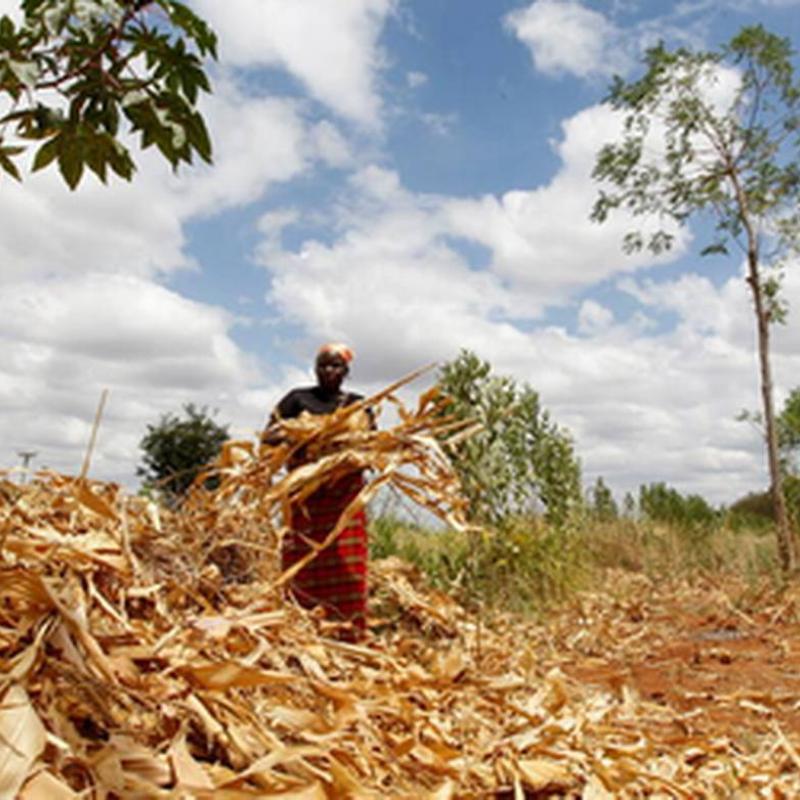
AAAP in the Media
Displaying 1 - 3 of 3
Global Center on Adaptation, AfDB host regional forum on the future of resilient food systems in Africa

The Global Center on Adaptation (GCA) in collaboration with the African Development Bank and the Wangari Mathai Institute have concluded a three-day regional forum on the future of resilient food systems in Africa.
The Forum, called the Future of Resilient Food Systems in Africa – AAAP Digital Solutions for a Changing Climate provided training aimed at strengthening the capacity of stakeholders from across Eastern Africa to design and implement solutions to improve food security and climate resilience and to facilitate knowledge sharing among farmers on approaches to scale up the use of Digital climate-informed advisory services, or DCAS.
Digital climate-informed advisory services are tools and platforms that integrate climate information into agricultural decision-making. These services range from digital mobile apps, radio, and online platforms to digitally enabled printed bulletins based on climate models and extension services that utilize climate information platforms.
DCAS offers crucial opportunities to build the resilience of small-scale producers in the face of worsening climate change impacts. From seasonal forecasts to pest advisories, effectively designed services provide producers with the resources to adapt to climate shocks and plan for new climate conditions.
Globally, more than 300 million small-scale agricultural producers have limited or no access to such services because service provision is still fragmented, unsustainable beyond project cycles, and not reaching the last mile.
Speaking at the opening ceremony of the forum, Professor Patrick Verkooijen, CEO of Global Center on Adaptation called for urgent financial support to put Africa on the path of food sovereignty.
“Africa needs urgent support to scale up the implementation of adaptation solutions that are already yielding good results for irrigation, developing drought-resistant seeds, crops and livestock diversification, “ he said.
“Through the African Adaptation Acceleration Programme, AAAP, we are rolling out a $350 million project to build resilience for food and nutrition security in the Horn of Africa towards mobilising new digital climate technology for market information, insurance products, financial services that can and must be tailored to smallholder farmers’ needs”, he added.
Speaking on behalf of the African Development Bank’s East Africa Regional Director General, Nnenna Nwabufo, Dr Pascal Sanginga, Regional Sector Manager for Agriculture and Agro-Industries noted that the forum was timely, coming hot on the heels of the recently concluded Dakar 2 Feed Africa-Food Sovereignty and Resilience summit , organised by the African Development Bank.
“The Africa Adaptation Acceleration Program (AAAP) is already contributing to closing Africa’s adaptation gap by supporting African countries to make a transformational shift in their development pathways by putting climate adaptation and resilience at the center of their policies, programs, and institutions. There is no doubt that AAAP will be a strong component of the Country Food and Agricultural Delivery Compacts to accelerate the transformation of Africa’s food systems and build a more resilient Africa”, he said.
Professor Stephen Kiama Gitahi, Vice Chancellor of the University of Nairobi, reiterated the relevance of the forum pointing out that 70% of the population in Eastern Africa live in rural areas and depend on agriculture for their livelihoods. He encouraged the trainers to simplify the modules in a manner that removes the fear for technology and accelerate adaptation for rural farmers. Citing the legacy of late Professor Wangari Maathai he stated:
“We acknowledge that gaps exist on climate adaptation in the rural communities and those can be smartly bridged with the use of digital smart agriculture and climate innovations to create great conservation impact in our region.”
The forum brought together stakeholders from ministries of agriculture, related government agencies, public research institutions, farmer organizations, universities and non-profit organizations working on climate adaptation for food security in Eastern Africa. These included participants from Djibouti, Eritrea, South Sudan, Burundi, Rwanda, Mauritius, Tanzania, Seychelles, Sudan, Ethiopia, Rwanda and Kenya.
About Global Center on Adaptation
The Global Center on Adaptation (GCA) is an international organization which works as a solutions broker to accelerate action and support for adaptation solutions, from the international to the local, in partnership with the public and private sector. Founded in 2018, GCA operates from its headquarters in the largest floating office in the world, located in Rotterdam, the Netherlands. GCA has a worldwide network of regional offices in Abidjan, Cote d’Ivoire; Dhaka, Bangladesh and Beijing, China.
About the Wangari Maathai Institute, University of Nairobi
The Wangari Maathai Institute (WMI) for peace and environmental studies is a global centre for teaching and research on environmental management, governance, peace and conflicts and the nexus between peace and democracy. The centre was founded in 2009 with the support of the Government of Kenya (GoK), the African Union(AU) and the African Development Bank(AfDB) to celebrate and immortalize the work of the late Nobel Laurete
Prof.Wangari Maathai who was a global champion on environmental conservation and governance. The centre trains future leaders and Champions for environment. The Centre is located in the serene environment in Upper Kabete suburb of Nairobi City.
Climate Resilient Water Services Burundi
Burundi, a landlocked country in East Africa, faces several water-related challenges that have significant implications for its population and development.
a) Climate Change Impacts: Burundi is vulnerable to the impacts of climate change, including changes in rainfall patterns and increased frequency and intensity of droughts and floods. These changes disrupt water availability and exacerbate water-related challenges, affecting agricultural productivity, food security, and livelihoods. B) Lack of Water Infrastructure and Management: Insufficient investment in water infrastructure, including dams, reservoirs, and water treatment facilities, hampers the effective management and distribution of water resources in Burundi. Inadequate maintenance and operation of existing infrastructure further contribute to water supply constraints.
The Project Development Objective (PDO) is to strengthen the resilience of the people in five rural provinces of Burundi to climate change through sustainable improvement of drinking water supply infrastructures and service
- Rapid Climate Risk Assessment and Identification options for catchment resilience building
- Identify and develop a detailed catalogue – including technical details, cost/benefit analysis, and so on – of potential – NBS – solutions to increase climate resilience of catchments in the project area.
- Understanding climate related risks to the catchment and different characteristics that help identify suitable adaptation measures
- Understanding climate related risks to the relevant catchments and different characteristics that help identify suitable adaptation measures. This includes an assessment of critical flood, drought, and heat-related risks, including estimates of changes in temperature and frequency, seasonality, and intensity of rainfall
- Technical assistance to design adaptation measures mainly for the catchment
- Provide technical assistance to design climate related risk reduction measures through a combination of grey and green investments
- Improved access to secure water services and their incomes for populations
- Populations in targeted rural areas are more resilient to waterborne diseases, global pandemics such as cholera and to climate change effects
- Sustainable and enhanced mechanisms for quality of water service in the targeted areas are set up and made functional through private sector participation
- Strengthened capacities of stakeholders in regards to resilience to climate change and good governance
- Promoted hygiene and sanitation practices through awareness campaigns and the construction of adequate sanitation facilities
- Implemented watershed management and reforestation initiatives to reduce soil erosion, protect water sources, and improve water quality
- Enhanced climate resilience by promoting water conservation techniques, rainwater harvesting, and drought-resistant agricultural practices
- Strengthened water governance institutions, regulations, and policies to ensure sustainable management and equitable distribution of water resources
- Encouraged partnerships and collaboration among government agencies, NGOs, and international organizations to mobilize resources and expertise for water-related projects
- Promoted community participation and awareness through education and training programs on water conservation, hygiene, and water resource management
€15 million AfDB Investment
